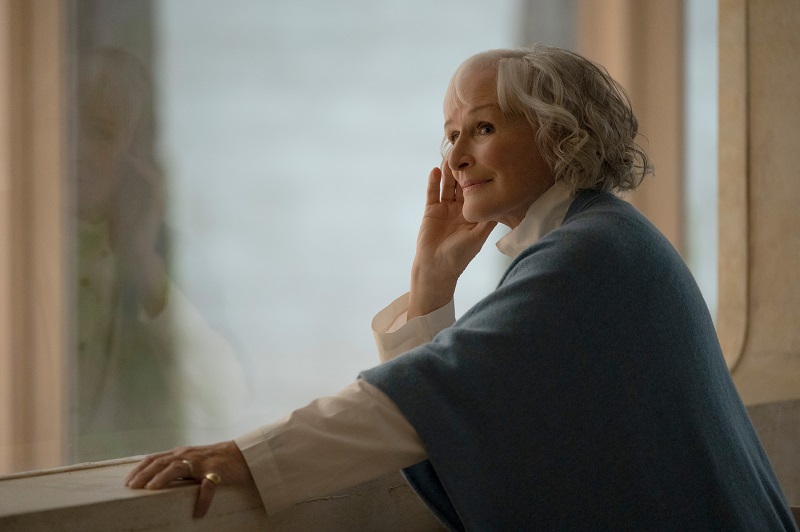As audiences clamor for more original programming—i.e., not sequels, remakes, comic book movies, or films based on books, they’ve also shown an either increased refined definition of what brings them to the theater. Lately, the only films that have done well are science fiction and yes, comic book flicks.
Along comes Oscar winner Mahershala Ali (who also served as one of the film’s producers) with Swan Song. It is a cinematic experience that should tick all the boxes of what gets us out of the house and into a theater—particularly with the Omicron variant starting to take over. Lucky for us, Swan Song is an Apple+ film and a stunning one at that.
It is one of those stories that not only make you think but has viewers looking inward checking in with oneself to see where we are at on numerous levels.
Ali stars as Cameron and Jack. Cameron is dying from an aggressive form of cancer and thanks to the advanced technology of this near future, he can ensure that his children will grow up with him around and his wife Poppy (Naomie Harris, No Time to Die), not a widow. In fact, she was as happy as she could ever envision.
Glenn Close’s Dr. Jo Scott has established a facility where dying people are recreated, aka reborn, with annoying ticks or habits and obviously, their faulty health history is course-corrected. It is in the initial stages of its roll-out and Ali’s Cameron is among the first. In fact, when Dr. Scott takes Cameron to meet a clone in Awkwafina’s Kate “duplicate,” he has no idea that she is a replicant—only because Dr. Scott informed him. That way, Kate’s daughter lives in a reality where she grows up with a mother. Although she will be “gone,” Kate’s duplicate knows everything about Kate and honestly, understands her better than she comprehends herself.
Cameron is sold. He tells his wife he has a business trip coming up and instead heads to Close’s clinic to meet Dr. Scott and start the process with Jack (his duplicate) There’s a slew of moral issues that are intelligently dealt with in Swan Song and a bevy of bodaciously complicated issues that are naturally going to arise in such a situation.
Writer-director Benjamin Cleary makes his big-screen debut with Swan Song and talks about swinging for the fences. This is a heady subject matter that is littered with landmines that could derail a storyteller’s mission. That is not the case here, as Cleary has an absolute firm command of the material and as its writer, nobody knows this futuristic world better than Cleary and it shows on every frame of film.
The filmmaker obviously knows what he wants to say and how he wants to phrase it. We are living in a time where technology and ethics are starting to collide and how we go forward will define the parameters of the digital age for years to come. What better way than to go all the way as he has here with matters of life and death, leaving behind your loved ones and above all else, providing a means for families to continue their collective relationship with a family member who is integral to everything.
Ali, fresh from his win as Best Supporting Actor for Moonlight (and then a year later he won the same category for Green Book), continues to impress with his turn as two souls who are different but are the same. We don’t know exactly why he is going to perish, but if one had to guess, there is a tumor inside his brain that makes him collapse and break into seizures at times. His quality of life is going to continue to deteriorate, something he sees firsthand with Kate as she slips from vibrant with a sense of humor, to sickly with a sense of humor, to a character whose presence in the film is immediately felt when it’s gone.

Awkwafina, who has been killing it as a comedienne in films such as Ocean’s 8 and Shang-Chi and the Legend of the 10 Rings, has also shown her dramatic talents in Swan Song and last year’s The Farewell. What she brings to Swan Song is a groundedness and mentorship that is sorely needed for the lost and seeking solace Cameron. Their chemistry is impressive, considering that these two characters are first meeting at Dr. Scott’s establishment. Their shared life experience bonds them immediately and a delightful (and yes, tragic) friendship emerges that adds so much to Swan Song. It also fills in blanks ethically about what would drive someone to do something like this. It is seeing Kate looking healthy and happy, working her job, and witnessing a quality of life that is quite high, that Cameron sees his “future.”
Swan Song is one of those films where you are going to want to watch it with a group or plan with a few friends to watch it over the weekend and then discuss it all week, via phone and text.
What would you do if you had the means?
That is just one of the inquiries that arise from Swan Song. As technology continues to grow, advance, and actively influence our daily lives, these types of discussions will be innate to human existence and advancement. What makes Cleary’s film so compelling is that the issues, moral and personal, that Cameron faces with this final act of his life are as raw as one would expect them to be.
In fact, what he goes through with his Swan Song lingers with you, long after the experience expertly crafted by Ali, Harris, Awkwafina, and their fearless leader—Cleary—conclude.
Luckily for movie fans the globe over, Cleary’s monumental achievement is currently available on the streaming giant, Apple+, as well as in theaters. However, one chooses to witness one of the best of 2021, know this—you are in for a mental, moral, and magnificent journey.
Grade: A


